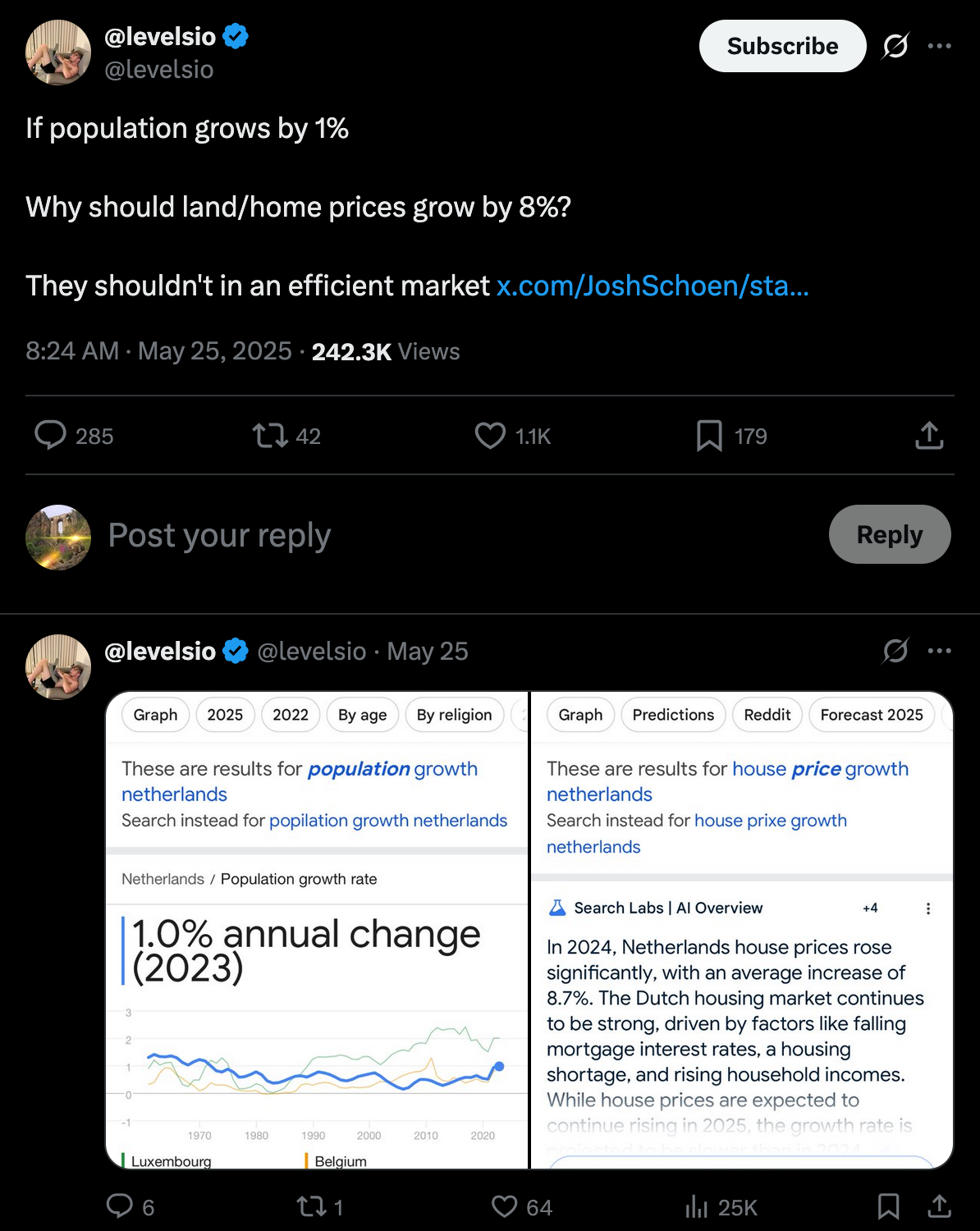

Get to the core of the problem.

Over the weekend, prolific vibe coder levelsio took to X to complain about the state of housing affordability across Europe. Something that I was very happy to see considering the fact that there is a massive real estate affordability crisis across much of the world and it is important that people who are respected and have platforms speak out when they identify the problem as well. More eyes and focus on the problem is how something begins to get solved.
With that being said, I think levelsio is missing the forest for the trees by blaming institutionalized NIMBYism, burdensome regulations and governments hoarding land that should instead be given to developers to produce more housing supply. I quote tweeted this particular tweet on the subject from levelsio and wanted to take some time today to republish those thoughts here and expand on the topic.
It’s almost as if real estate is being used as a store of value asset instead of the consumable good that it is.
What @levelsio is observing here is called a “monetary premium”. A monetary premium is the value added on top of the consumable/aesthetic/location value of real estate.
This monetary premium exist because central banks and governments have distorted the market for money and people are forced to push value into assets that are scarce relative to dollars. Over the last 50 years real estate has been one of the relatively scarce assets of choice.
The housing affordability crisis is a negative externality of the market reaction to the corruption of money. It can only be fixed by re-introducing hard money into the economy that enables people to store value reliably. If that emerges they won’t have to store value in real estate, the monetary premium of real estate will dissolve and prices will correct to their proper valuations.
This is one of the problems that bitcoin solves.
It’s still early yet, but more and more people are recognizing the utility provided by a neutral reserve asset that can’t be manipulated by central planners. At scale, the effect on assets that have accumulated a monetary premium over decades will be material. All of these assets are significantly overvalued and their monetary premium are leaking into bitcoin.
Put another way, "It's the money, stupid." Now, this isn't to say that the supply of housing in certain areas being artificially restricted isn't having an effect on the price of housing. This is certainly true, especially in cities like San Francisco where there is a relatively strong demand because of the economic density of the area and the desire of many high agency and productive people to live there. But I would put forth that the monetary premium is still the bigger problem and no amount of de-regulation to enable the supply of housing to increase will solve the affordability crisis in the long-run. The only way to get to the root of this specific problem is via bitcoin's mainstream adoption as an apolitical uncontrollable asset with completely idiosyncratic risks when compared to any individual asset class.
Let's say the government did ease up regulations and local NIMBY sympathetics were shoved in a corner to allow new units to be built. This doesn't solve the problem in the short-run because there is a time-delay between when regulations are lifted and when new supply actually makes it to market. In the interim, governments and central banks are inevitably going to go further into debt and be forced to print money to monetize that debt. This will exacerbate inflation and even if new real estate units are brought to market, the builders/owners of those properties will likely have to demand elevated prices to attempt to keep up with inflation.
This also does nothing to solve the problem of real income and wage growth, which are significantly lagging real inflation. Even if prices came down because of a surge in supply, could the Common Man afford a down payment on the property? I'd be shocked if this was the case. And since it's likely not the case the only way to get people into these houses as "owners" would be to offer them zero-down financing, which makes people feel richer than they actually are and leads them to make financially ruinous decisions.
It's the money, stupid. People need a way to save so that they can buy in the first place. Fiat currency doesn't allow this and the only people who can save effectively are those who make enough money to funnel into substitute store of value assets like real estate.
As it stands today, the price-to-income ratio of real estate is 5.0x and the price-t0-rent index is 1.36. Up from 3.3x and 1.14x respectively where the metrics sat in the year 2000. The growth in these ratios is driven predominately via their monetary premium.
And guess what, it's about to get much worse. Donald Trump, Treasury Secretary Scott Bessent and Elon Musk have all signaled that the plan moving forward is to attempt to drive growth and productivity as high as possible while also letting deficits and the debt increase unabated, which means that inflation is likely to continue unabated and potentially increase.
It might make sense to get some bitcoin if that is the case.

Jessy Gilger raised serious concerns about MSTY and similar derivative products that promise eye-popping yields. He pointed to the COVID crash where gold mining ETFs using derivatives collapsed 95% and never recovered, despite gold itself performing well. Jessy noted that while his team calculated reasonable MicroStrategy covered call yields of 16-22%, MSTY advertises 120% annualized distributions - a red flag that suggests these aren't sustainable dividends from profits, but potentially just returning investors' own capital.
"If a whale pees in the pool, everyone is affected." - Jessy Gilger
Jessy explained that when large investors need to exit these pooled products during market stress, they must sell derivative positions into illiquid markets with no buyers, potentially triggering catastrophic losses for all participants. His solution? Private pools through separately managed accounts that achieve similar income goals without the contagion risk of being trapped with panicking whales.
Check out the full podcast here for more on Gannett Trust's multi-sig solution, Bitcoin retirement planning and corporate treasury strategies.
World's Largest Bitcoin Conference Starts Tomorrow- via X
Remixpoint to Buy Additional ¥1 Billion in Bitcoin - via X
Get our new STACK SATS hat - via tftcmerch.io
Marty to Judge Bitcoin World Record Try in Vegas - via X
Bitkey is an easy, secure way to move your Bitcoin into self-custody. With simple setup and built-in recovery, it’s the perfect starting point for getting your coins off centralized platforms and into cold storage—no complexity, no middlemen.
Take control. Start with Bitkey.

Ten31, the largest bitcoin-focused investor, has deployed 158,469 sats | $150.00M across 30+ companies through three funds. I am a Managing Partner at Ten31 and am very proud of the work we are doing. Learn more at ten31.vc/invest.
Final thought...
Looking forward to a fun, productive and wholesome week in Las Vegas, Nevada.
Get this newsletter sent to your inbox daily: https://www.tftc.io/bitcoin-brief/
Subscribe to our YouTube channels and follow us on Nostr and X: